Premeditatio Malorum
Field Notes II.XXIX: The Stoic technique of considering the worst to experience the best
Welcome to Field Notes!
You are going to die. And so am I. When and how are mostly out of our control, but it is an unavoidable fact. Have you really thought about it? Does the idea make you uncomfortable?
Since you are reading this, the chances are that you are from a first world country, just like me. We have nice things. Our hard work is normally rewarded and we improve out situations with better houses, transportation, technology, et cetera. This is all well and good, if we remember that all of these comforts and possessions are in essence outside of our control. Your house burns down. You are served with a lawsuit. The stock market crashes. Your kid gets sick and may not make it. Have you thought about these possibilities? Do they make you uncomfortable?
Why?
Therefore, nothing ought to be unexpected by us. Our minds should be sent forward in advance to meet all problems, and we should consider, not what is wont to happen, but what can happen. For what is there in existence that Fortune, when she has so willed, does not drag down from the very height of its prosperity?
…We should therefore reflect upon all contingencies, and should fortify our minds against the evils which may possibly come.
Exile, the torture of disease, wars, shipwreck—we must think on these.
- Seneca
In the ancient philosophy of Stoicism there is a technique called premeditatio malorum. This is, essentially, the contemplation of bad possibilities. It is to call to mind a worst case scenario and look at what the consequences would be. But, why would anyone want to do that?
There are two powerful benefits of this practice. First and most apparent, it prepares us in the event that these things actually do happen. Tragedy hits the hardest when it is unexpected. If we have considered the possibility beforehand we are not caught off guard and can more easily navigate it with composure. Nihil admirari- be surprised by nothing.
The art of living is more like wrestling than dancing, because an artful life requires being prepared to meet and withstand sudden and unexpected attacks.
- Marcus Aurelius
For those of you who don’t know, I work as a police officer. Many mornings, in the dark quiet before the sunrise, I consider some of the terrible things that could happen in the day ahead. I also think about what I need to be prepared to do in those situations, and this may involve violence or sacrifice.
Here I must make a small but critical distinction. I believe this Stoic technique is to contemplate possibilities of what could occur, so that we are mentally prepared for them. But, we do not want to visualize our own defeat and, unwittingly, mentally train for failure.
You may read this and be mildly horrified at the idea of it. But, here is the thing. I guarantee you that those initial responding officers in Uvalde, Texas did not ever consider that they would find themselves in a scene like that. Humans don’t always live up to their dreams of who they think they are or want to be. I am no different, but my hope is that premeditatio malorum will help me when the moment comes.
If you would not have a man flinch when the crisis comes, train him before it comes.
- Seneca
The second benefit of visualizing catastrophe is that we learn a deep appreciation for what we have, while we have it. Humans have a remarkable ability to take things for granted. We rapidly become accustomed to comfort and convenience. As our minds become assured that these same levels of ease will be there tomorrow, we begin to want even more and better and forget what life was like before them.
My smart phone is more than five years old. I see the capabilities of the newest models of iPhones and really start to want an upgrade. But, what if I didn’t have any phone with me and my truck broke down far away from home? I couldn’t call anyone. I couldn’t pull up a map to find the closest convenience store. Using premeditatio malorum I now view my old phone and these basic functions with a new level of appreciation.
We can apply this equally to anything we love- possessions, money, even to our friends or relatives. Would you take the time to watch the sunrise if you considered that it might be the last one you experience? Do you savor the cool air conditioning on a sultry summer afternoon when you think of a prolonged power outage? We can consider for a moment that as our spouse walks out the door they might never return. Then, don’t we hold them closer while they are here and when they do return, don’t our eyes light up and our smiles become even brighter?
He is a wise man who does not grieve for the things which he has not, but rejoices for those which he has.
- Epictetus
At this point we may step it up a notch. Premeditatio malorum is a great exercise, but it is all mental. Some Stoics advocated deliberately going without certain comforts for short periods of time in order to heighten our gratitude even further.
Set aside a certain number of days, during which you shall be content with the scantiest and cheapest fare, with coarse and rough dress, saying to yourself the while: ‘Is this the condition that I feared?’ … It is precisely in times of immunity from care that the soul should toughen itself beforehand for occasions of greater stress, and it is while Fortune is kind that it should fortify itself against her violence.
- Seneca
Personally, and quite obviously to you Field Notes readers, I experience this regularly while backpacking. After days of minimalist living, exposed to the elements of heat or cold, and sustained strenuous effort, the clean, dry cotton shirt that waits in my truck for my return is a joy like no other to put on.
I have just recently returned from a trip to Honduras. Temperatures were viciously hot and I worked for hours in the mid day sun, becoming saturated with sweat. Air conditioning was not available except in the room at night. I did laundry with a washboard and basin. I tolerated these conditions fairly well because I am familiar with them from my experiences backpacking.
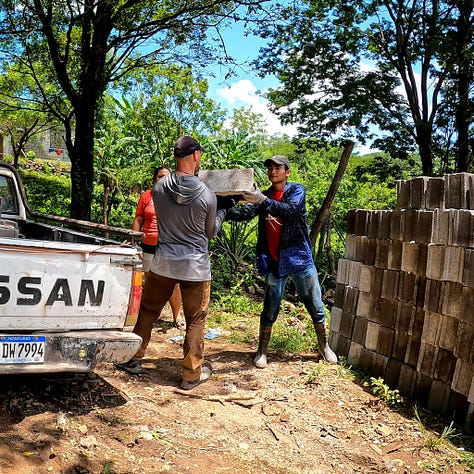
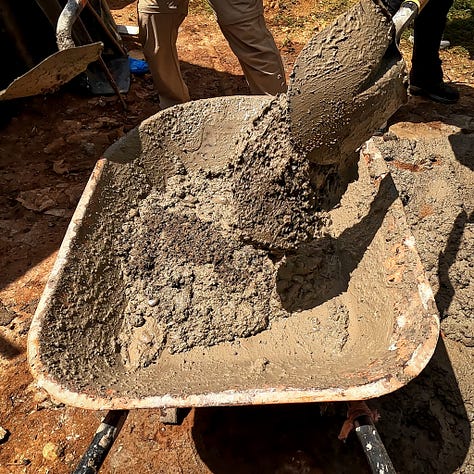
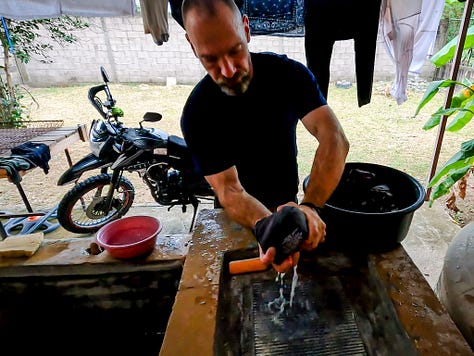
As a visitor from a developed country, the conditions of the people living there were disquieting. Many homes were shacks pieced together with sticks and panels of tin or plastic sheeting. Children wore whatever clothes were available, with no concern for appearance or style. Starving pets and farm animals roamed the dirt streets.
Despite these circumstances, I experienced among the people feelings of community and joy. I saw gratitude and a relaxed sense of appreciation devoid of comparisons. I remember these attitudes more than anything, now that I have seen and experienced a little bit of their life.
As I returned home I also returned to the normal patterns of my life. Air conditioning and access to nutritious food. Ease of mind knowing that advanced medical care is less than an hour and a half away. A lifestyle requiring regular exercise because the day’s labor is just not enough to maintain fitness. Freedom from fear of water or mosquito borne illness. A comfortable bed of my own. I now see all of these familiar things as if they are wondrous and new, and am filled with thanks for all that I have.
The trip was about both the adventure of exploration and to bring some help to those people. I wonder if, by their example and the resulting premeditatio malorum, they have helped me even more.
This is my first attempt at expounding on a Stoic topic here, at least as far as I understand it. I consider myself a clumsy practitioner and in no way an authority or teacher, so I am open to correction. Is this helpful? Questions, comments, or concerns? I might not have an answer, but can probably point you to someone who does!
Alright, you guys, Buckle up! Next week we are headed to Honduras! It was a fantastic experience that I am looking forward to sharing. I hope you’ll join me!
Are you getting something out of Field Notes? Help me make it better! You can do this by sharing, subscribing, or supporting with a paid subscription.


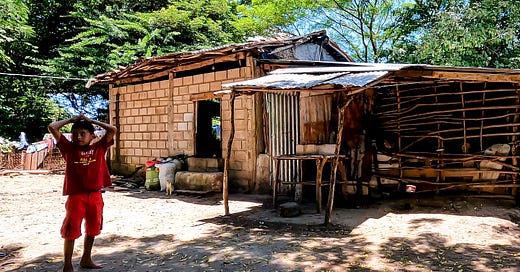





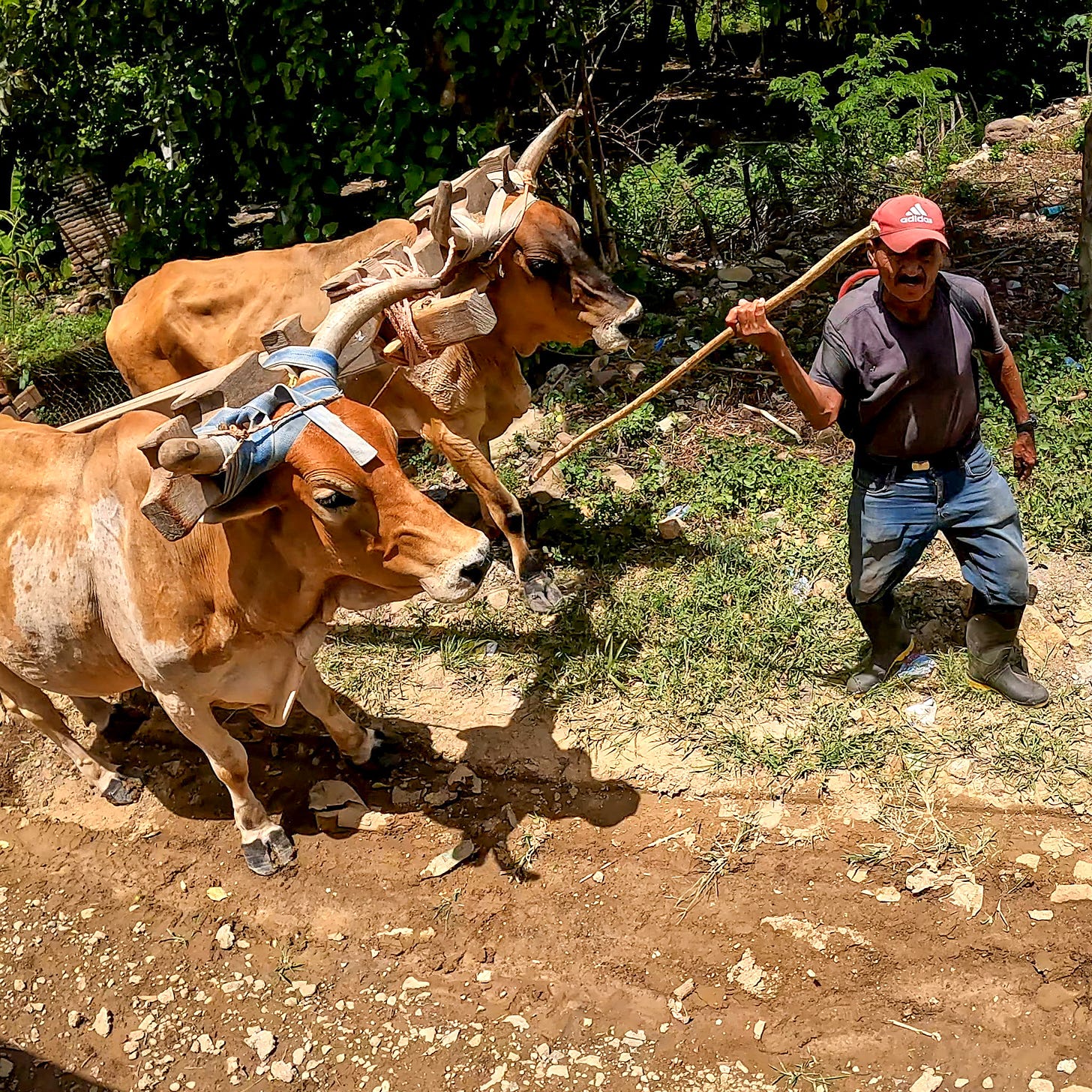



Stoicism resonates with so many people (in the developed world) at the moment exactly because it brings balance and perspective - thanks for the reminder. Great article Erik.
Great benefit to considering what could go wrong: it reduces importance and “desperation” in what we are trying to achieve in life. When we consider the possibility of failure, we have the opportunity to think of backup plans and/ or come to terms with the imaginary loss. Life runs from the desperate and runs toward the prepared. Just hoping for the best is poor planning.